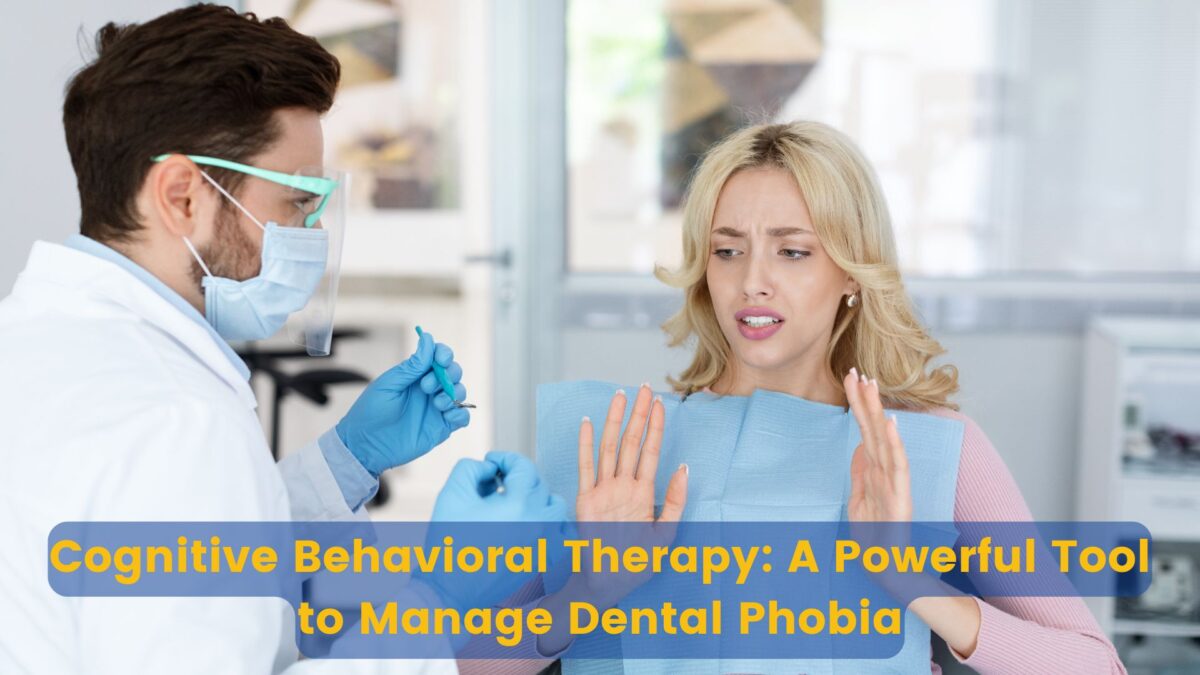
Introduction
For many individuals, the mere thought of visiting the dentist can trigger overwhelming anxiety, a condition commonly known as dental phobia. This fear can be so severe that it prevents people from seeking essential dental care, leading to significant oral health issues. The good news is that Cognitive Behavioral Therapy (CBT) has emerged as an effective treatment for managing dental phobia. This therapeutic approach helps individuals reframe their thoughts, manage their anxieties, and ultimately overcome their fear of the dentist.
In this article, we will explore the role of CBT in managing dental phobia, how it works, and the benefits it offers to both patients and dental professionals. If you or someone you know struggles with dental fear, CBT could be the solution to make dental visits less daunting and improve overall health.
What is Dental Phobia?
Dental phobia, also known as odontophobia, is an intense fear or anxiety associated with dental visits or procedures. While it’s common to feel a little uneasy before a dental appointment, dental phobia takes this discomfort to the extreme, often causing people to avoid dental care altogether. Symptoms of dental phobia include:
This phobia can stem from a variety of factors, including negative past experiences, fear of loss of control, or even generalized anxiety disorders. Left unaddressed, dental phobia can result in poor oral health, contributing to systemic diseases such as heart disease and diabetes.
The Impact of Dental Phobia
Dental phobia not only affects a person’s oral health but also has broader psychological and social implications. People with this phobia are more likely to:
Avoiding dental care can create a vicious cycle of anxiety and deteriorating oral health, making it essential to find effective management strategies.
What is Cognitive Behavioral Therapy (CBT)?
Cognitive Behavioral Therapy (CBT) is a widely recognized and effective psychological treatment for anxiety-related disorders, including dental phobia. CBT focuses on identifying and modifying negative thought patterns and behaviors that contribute to anxiety. By helping patients reframe their fear of the dentist and develop coping mechanisms, CBT can reduce the emotional intensity of their phobia over time.
CBT is based on the principle that our thoughts, emotions, and behaviors are interconnected. By changing the way we think about a situation (in this case, dental visits), we can change how we feel and behave in response to that situation. This form of therapy has proven effective in helping patients overcome a wide range of fears and anxieties, making it an ideal approach for managing dental phobia.
How CBT Works for Dental Phobia
CBT for dental phobia typically involves several key techniques:
Benefits of CBT for Dental Phobia
CBT offers several advantages when it comes to managing dental phobia:
Medication
While some patients use anti-anxiety medications or sedatives to manage dental phobia, these are often temporary solutions that do not address the underlying fear. Medications can also have side effects and may not be suitable for everyone. CBT, on the other hand, focuses on long-term behavior change without reliance on drugs.
Sedation Dentistry
Sedation dentistry, where patients are given sedatives to help them relax during dental procedures, is another option for managing dental phobia. However, sedation only addresses the immediate fear of the procedure and does not provide patients with coping skills for future dental visits. In contrast, CBT equips patients with the psychological tools needed to overcome their fear permanently.
Hypnotherapy
Hypnotherapy is sometimes used as a treatment for dental phobia. While it can be effective for some individuals, it may not work for everyone, and its success largely depends on the patient’s openness to hypnosis. CBT, in comparison, has a well-established evidence base and is effective for a wide range of patients.
Creating a Supportive Environment
Dental professionals play a crucial role in helping patients manage their phobia. Creating a calm, reassuring, and supportive environment can significantly reduce anxiety for phobic patients. Dentists can:
Collaborating with Mental Health Professionals
Dentists can also collaborate with mental health professionals trained in CBT to create a comprehensive treatment plan for patients with dental phobia. This multidisciplinary approach ensures that patients receive both psychological support and high-quality dental care, increasing the chances of successful outcomes.
Dental phobia is a common yet debilitating condition that prevents many individuals from seeking necessary dental care. Fortunately, Cognitive Behavioral Therapy (CBT) offers a proven and effective way to manage dental phobia by helping patients change their thoughts, emotions, and behaviors surrounding dental visits. Through cognitive restructuring, exposure therapy, and relaxation techniques, patients can overcome their fear and regain control over their oral health.
By addressing both the psychological and practical aspects of dental anxiety, CBT provides a long-term solution that empowers individuals to approach dental care with confidence. If you or someone you know suffers from dental phobia, consider exploring CBT as a path toward improved oral health and overall well-being.
#DentalPhobia #CBT #DentalAnxiety #OvercomeDentalFear #MentalHealth #AnxietyTreatment #DentalCare #OralHealth #CognitiveTherapy #DentistFear